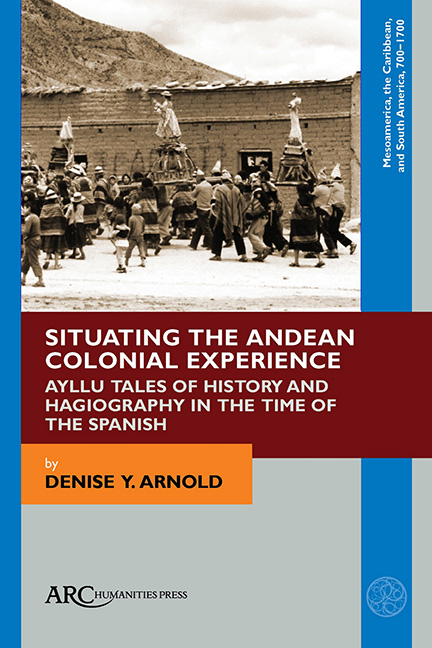 Situating the Andean Colonial Experience
Situating the Andean Colonial Experience Book contents
- Frontmatter
- Contents
- List of Illustrations
- Note About the Spelling of Toponyms and Proper Names
- Acknowledgements
- Maps
- Introduction
- PART ONE THE ORAL HISTORY OF QAQACHAKA
- PART TWO THE COLONIAL CACIQUES IN ORAL AND WRITTEN HISTORY
- PART THREE QAQACHAKA MARKA
- PART FOUR THE SAINTS APPEAR
- PART FIVE THE RELIGIOUS PRACTICES OF QAQACHAKA MARKA
- Some Conclusions
- Glossary
- Appendix A Document C of Don Franco Quispe Maraza
- Appendix B Document K of Don Franco Quispe Maraza
- Bibliography
- Thematic Index
- Index of Toponyms
Chapter 5 - Settling the New Place of Qaqachaka and its Ayllus
Published online by Cambridge University Press: 22 June 2021
- Frontmatter
- Contents
- List of Illustrations
- Note About the Spelling of Toponyms and Proper Names
- Acknowledgements
- Maps
- Introduction
- PART ONE THE ORAL HISTORY OF QAQACHAKA
- PART TWO THE COLONIAL CACIQUES IN ORAL AND WRITTEN HISTORY
- PART THREE QAQACHAKA MARKA
- PART FOUR THE SAINTS APPEAR
- PART FIVE THE RELIGIOUS PRACTICES OF QAQACHAKA MARKA
- Some Conclusions
- Glossary
- Appendix A Document C of Don Franco Quispe Maraza
- Appendix B Document K of Don Franco Quispe Maraza
- Bibliography
- Thematic Index
- Index of Toponyms
Summary
Cantones are certain free cities in Germany that do not recognize a Lord: they say there are twenty-two (such) republics.
Covarrubias, Tesoro de la Lengua Castellana o Española (1611, 100)AT THIS POINT, Don Franco left his main narrative about the composición of land, to explain how Qaqachaka, now a viable place to live situated on the route between Condo and Potosí, came to be populated. Yet again he underlines the importance of the mit’a service as a modality of contract between the new originario landowners and the Colonial State to guarantee the possession of their lands in perpetuity.
How the New Place was Populated
Apart from serving in the mit’a, another juridical aspect demanded by the colonial dispositions concerning the pueblos de indios was that of assuring sufficient population to accomplish the ongoing demands for manual labour and agricultural production. Hence the preoccupation of the few inhabitants to settle the territory of Qaqachaka with whatever passer-by they could find. This possibility was made easier by the situation in the region at the end of the seventeenth century, with devastating epidemics in the urban centres and a massive flight, even of mestizos and creoles, towards the rural areas, to escape a premature death:
Then they arrived from other parts, they arrived here. And they (from here) beseeched those who passed by on the road, “Why don't you stay here? We don't have enough people. Help me.” There were also visits (from folks) with llamas:
“Stay here. We don't have enough inhabitants,” they said. And so the population grew. Because at that time there were things (to do); there were services and obligations (to accomplish).
“Fine,” they replied.
Then the grandparents from Condo become greater in number, with persons who knew how to think (wali piq’inaka) and with rich-ones (qapaqa). Because we grew in number together with those from Condo and other parts. Qaqachaka was formed in this way, by swearing oaths of allegiance. They procreated in this way too. And so they were able to form a cantón in Qaqachaka.
At first glance, the repeated reference in Don Franco's episodes to Qaqachaka as a “cantón,” already in the seventeenth century, around 1646, seems quite strange.
- Type
- Chapter
- Information
- Situating the Andean Colonial ExperienceAyllu Tales of History and Hagiography in the Time of the Spanish, pp. 91 - 102Publisher: Amsterdam University PressPrint publication year: 2021


